10 Tips from a Seasoned Solo Traveler
How to Make the Most of Your Travels
Abroad
Article and photos by Ted
Campbell
Published 8/7/2015
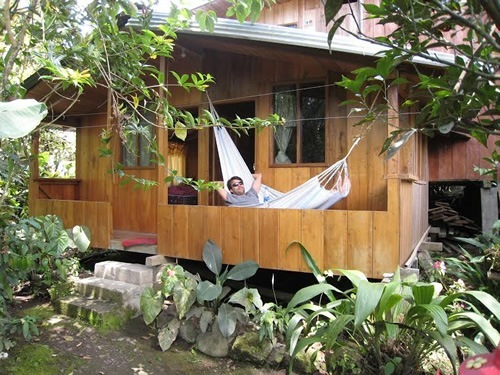
|
|
The author stays in a hotel in
Ecuador for a very good price.
|
Backpacking, adventure travel, solo
travel — whatever you call it, flying to a new country with
no plan, knowing little of the local language, bringing
along just a bit of money, and having lots of time available
is a much different experience than your week at the beach
on vacation from work.
I’ve made plenty of mistakes.
In Europe I carried the huge external frame backpack that
I used for wilderness backpacking, complete with a sleeping
bag and tent that I set up maybe three times in as many
months.
In Bolivia I had only one functional
ATM card, which I lost and then spent two weeks without
money. In the Philippines I got off the airplane after midnight
with no plan, no map, no hotel, no taxis, and no idea where
I was.
You live, you learn. You make mistakes.
But you must learn from them.
You might find some of these tips obvious,
but I have to admit there was a time when each wasn’t
so obvious to me.
1. Slow the heck down
You can tell a lot about a country by
how fast people walk on the street. And you can tell a lot
about the person who pushes by in a hurry, and while on
vacation!
Slow down! What are you in a hurry for?
You’re not going to see it all in one day, three weeks,
six months, a year, or a lifetime. You’re never going
to see it all.
Don't plan activities every day. Don’t
plan anything. Put on a good pair of shoes, put some water
and a sweater or raincoat or whatever into a small backpack,
and hit the streets.
In Beijing, after a day and a half of
endless palaces, temples, and walls, all amazing and wonderful,
I ditched a 5-day all-inclusive guided tour. I took a cab
to the hotel — the driver drove in circles and overcharged
me like crazy — where I lay in bed for about 30 minutes.
Then I changed clothes and I left the hotel. I picked a
direction and just started walking.
I wandered through a sprawling street
market built over dusty grey-dirt roads, with all the weird
stuff on sale that you’d imagine from China: live
animals great and small, roasted scorpion on a stick, and
bags of dried seahorses.
Then after crossing a brief takeover
of modernity, with Kentucky Fried Chickens and hotels like
mine, I stumbled into a hutong, an ancient Chinese
neighborhood of cramped cobblestone streets, communal toilet-less
bathrooms, curious friendly locals, delicious cooking smells,
and 10-cent 40-oz beers.
It was the best day of the trip.
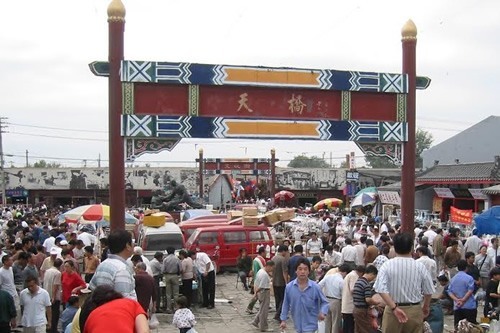
|
|
Enjoying a local market in China
as a solo traveler.
|
2. Less is more
I believe if you try to see more places,
to squeeze in every highlight of a country or even a region,
you will end up seeing much less.
You know what I’m talking about.
Central America in three weeks. Europe in three months. Or
the dreaded year-long, round-the-world trip.
I can spend two months only in Guatemala,
easy. Mexico? Give it half a year, at least. When I had
three months free in Asia, I went to five places in the
Philippines, no more.
You have three months free? Why not study
Spanish in Guatemala? Or learn to scuba dive in the
Philippines? Volunteer in Ecuador? Teach in Europe? Or
just really get to know one country, one region, one
city?
I figure that if you end up somewhere
far off in the world, for each place you visit you should
stay for either less than two days or more than two weeks.
If it’s great, it’s worth at least two weeks
— maybe more — and if it’s not, or if there’s
only one thing you wanted to see or do, then two days is
enough.
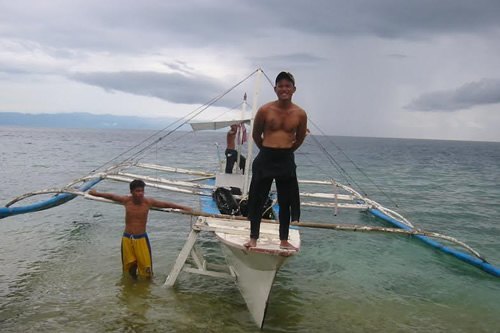
|
|
Learn scuba diving from a divemaster
in the Philippines.
|
3. Learn some basics of the
local language
Everywhere I go I learn how to say Do
you speak English? in the local language.
That’s the most important thing
to learn. It’s completely pointless to speak to someone
in English unless they understand English. Don’t even
say thank you. What’s the point? You’re
better off smiling sheepishly and shrugging your shoulders.
Even if it’s obvious the person
speaks English, asking them first in their local language
is the right thing to do. It shows respect, and it will
win you respect. You are, after all, guests in their house
or country.
Of course, it’s a little awkward
when they say no and keep talking. So
then learn hello, goodbye, nice to meet you, thank
you, bathroom, how much? and all the rest.
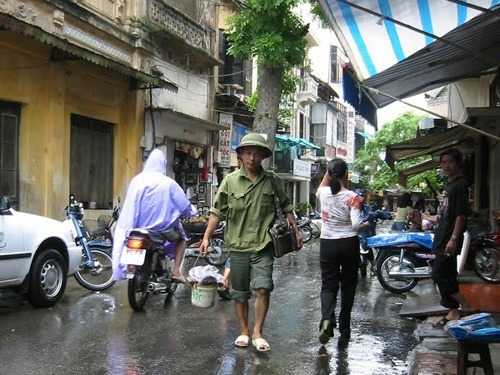
|
|
A typical street scene and daily
encounter in Vietnam. Try to say "hello" if
you can learn how to do so. It will open up a new
world of hospitality and respect.
|
4. Understand ATMs
Managing your money while traveling
can be complicated. You should learn about exchange rates,
international banking, border crossings, and ways to keep
safe. Read this (it could apply to anywhere): How
to Manage Your Money Safely on the Road in Latin America
At the very least, know how to use your
ATM card. Turn it over. See all the little symbols on the
bottom below your signature? Cirrus, Interac, the Exchange.
These are the money networks that your bank has access too.
Look for an ATM that has the same symbols
as your card. If they match, you can use the ATM, and if
not, maybe you can still use it — though probably not, and
the fees will certainly be higher.
By the way, for some reason Visa and
MasterCard are different, and some ATMs that have Visa or
MasterCard symbols still won’t work with your card.
Follow the magic symbols. And if your
card doesn’t have any, get a new bank.
5. Hotel or hostel?
Ah, the hostel. Instant friends. A kitchen.
Access to a computer, a book exchange, lots of local information.
And the noisy, insecure room of snoring
drunk people (present company included). The filthy bathroom.
The days on the hostel roof chatting and drinking instead
of going to the museum.
Hostels can be really fun, but I usually
avoid them in favor of small hotels. At least here in Latin
America, small hotels in the center of town are almost
always cheaper than a hostel.
Hostels get coverage in Lonely Planet
and have a never-ending supply of foreign backpackers, so
they can overcharge. The local hotel is for the locals.
So if you’re staying in a hostel, don’t claim
that it’s just to save money. You want to meet people.
Even when I stay in a private room in
a hotel, I always end up meeting people, but my bags are
secure, there won’t be a wait for the shower in the
morning, and if I really need to go to bed, I can, and no
one will stumble in drunk at 4 a.m. and fall into the table
like Chris Farley.
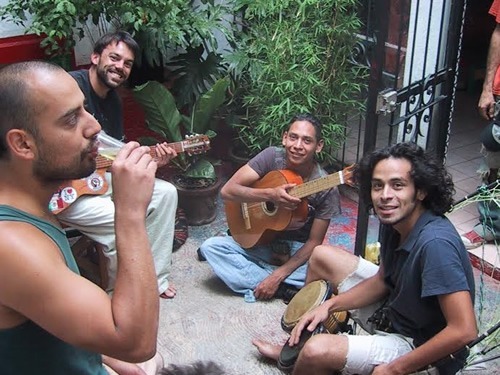
|
|
There are also decided advantages
to staying solo in the unique hostal in
Latin America.
|
6. Pack right
Of course pack light. Bring as little
as possible. Don’t bring anything irreplaceable —
leave your favorite necklace, your laptop, and the book
with a handwritten note from a friend at home.
You should be willing to lose or give
away everything you bring. When I’m a few weeks into
a long trip, my most precious items are notebooks full of
bad writing and the memory card from my camera. And my frisbee
— you can’t get a good one in Mexico.
Speaking of the frisbee, pack light
but also pack what you want. Be prepared. Some things I
carry on most trips are my guitar, flip-flops, tiger balm,
Gold Bond Medicated Powder, a spare book to trade in a book
exchange while I’m reading the current one, a first
aid kit, an extra pair of sunglasses, earplugs, and swim
shorts — even if I’m far from the beach. The hotel
may have a pool.
Think about what you need and bring
it. And if you find out that you don’t need it, give
it away on the road and buy something else to take its space.
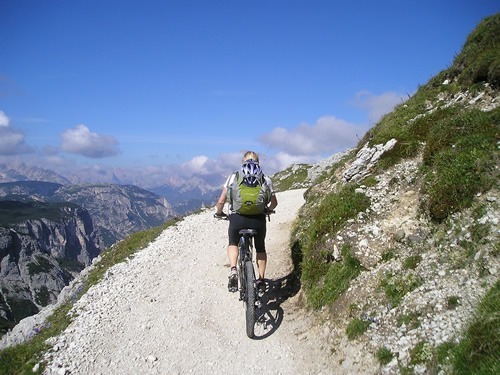
|
|
Some people just know how to
pack appropriately. Photo by Simon.
|
7. Eat right
One word: markets.
Everywhere I’ve been, the market
is the best for good, cheap eating. Buy fruit to eat for
breakfast. Get ingredients. Get a meal. Take a look at all
the little restaurants and food stands and what the people
are eating.
Aside from markets, working people all
over the world go out for lunch. Figure out where they go,
and eat there — it will be cheap and good. In
Mexico these small restaurants are called fonditas.
Choose the busiest food stand or restaurant
you can find. Never eat in an empty place. That’s
your best defense against getting sick, or at least having
a bad meal. If it’s empty, it’s usually empty
for a reason.
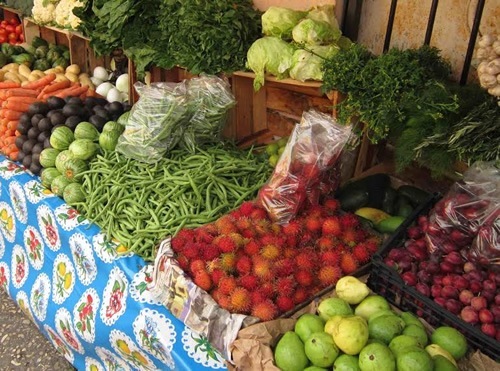
|
|
You can eat well and at a low
cost at markets around the world.
|
8. Personal safety
Every part of the world is different.
In Seoul, South Korea the bars stayed open all night and
the subway started around 5 a.m., so I’d get on sometime
after that to make the one-hour trek back to Shihwa, the
satellite city where I lived.
Usually I’d fall asleep, backpack
and guitar on the floor. Sometimes I’d wake up on
the wrong side of town in the late morning, much farther
away. Once I woke up inside some dark garage and I had to
yell and pound on the doors so someone would pull the train
out to let me off.
But no one ever stole my guitar. Some
of you are laughing — in X City, you’d lose your shoes
in two minutes!
What I’m saying is that you should
figure out how to be safe wherever you go. Ask locals you
meet, ask other travelers, and for sure ask the person at
the front desk of the hotel about the neighborhood you’re
in.
But besides that, here’s the most
important rule for safety:
When someone gives you a bad vibe, when
you no longer want to be around him or her, when he or she
weirds you out or scares you, get out of there.
Don’t make an excuse. Don’t
apologize. Just go. Do so tactfully, do so carefully, but
just go.
People often get in trouble simply because
they don’t want to embarrass or offend a stranger.
Don’t worry about it. Your safety is much more important
than your pride.
And when you say nicely that you have
to go and they get weirder, then you know you’ve made
the right decision.
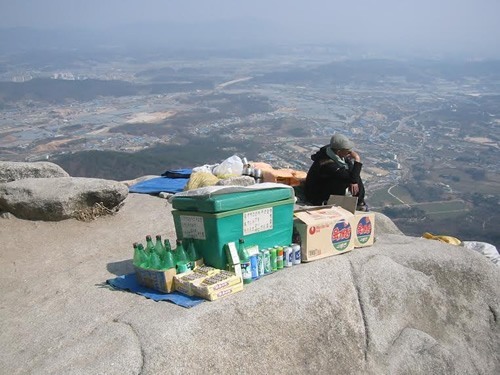
|
|
This man selling refreshments
at the top of a mountain in Korea was pretty laid
back with a good vibe, but you sometimes meet others
abroad who are more aggressive. Steer clear of people
with bad vibes. You have to trust your instincts.
|
9. Travel alone or with only
one other person
Never travel in a big group. If you
have a big group, pick a beach or party town and stay there.
Go at it, have a great time. Then when you’re sick
of everyone, go off on your own or with one friend.
Decisions are much harder to make in
groups. It’s hard to get anything done. It’s
hard to leave the hotel in the morning.
Traveling alone is nice. There’s
something about traveling alone that makes it easier to
meet people, perhaps because you’re forced into situations
where you must be more open.
If you’re worried about traveling
alone, just give it a try, but stay close to home. Take
a weekend trip in the nearest big city. Were you alone and
lonely the whole time? Or did you enjoy the freedom and
meet interesting people?
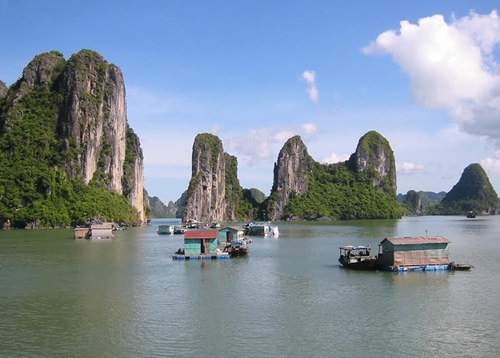
|
|
Some like the thrill of seeing
remarkably beautiful locations, such as this in Vietnam,
on their own, while others prefer to travel with another
or in a small group. Obviously, go with what makes
you most comfortable.
|
10. Embrace change — in
yourself
You can learn a lot about yourself through
travel. Be aware. Be mindful. Notice how people react to
you. Notice how you react to certain kinds of people, certain
situations, and certain places. And learn from it.
Don’t assume. It’s painful
to learn your assumptions are wrong, but even more painful
to hold onto them when faced with the truth of their falsehood.
Identify your preconceptions, your stereotypes,
your prejudice, and your strong reactions. In many of the
most beautiful and travel-friendly parts of the world you
will witness prostitution, children begging in the streets,
animal abuse, blatant racism, hardcore alcoholism, corruption,
and environmental degradation.
You will also meet travelers and locals
with different opinions and different ways of seeing the
world than you. They will challenge your beliefs, and your
beliefs will challenge them.
Don’t judge, don’t get upset.
Like Bruce Lee said, human beings must be like water. We
must flow.
Flow as you travel. Don’t paddle
upstream. Let the current take you.
And pack extra socks.
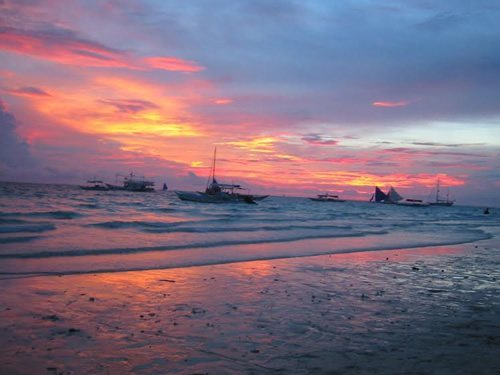
|
|
A sunset with boats in the Philippines
is one of many experiences that make solo travel all
worthwhile.
|
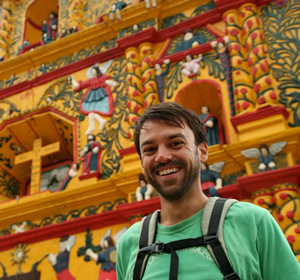
|
Ted Campbell is a freelance writer, Spanish-English translator, and university teacher living in Mexico.
He has written two guidebooks (ebooks) about Mexico, one for Cancun and the Mayan Riviera and another for San Cristobal de las Casas and Palenque in Chiapas, both also available at Amazon.com or on his website.
For stories of adventure, culture, music, food, and mountain biking, check out his blog No Hay Bronca.
To read his many articles written for TransitionsAbroad.com, see Ted Campbell's bio page.
|
|
